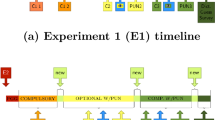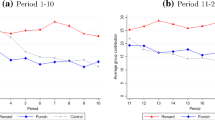Abstract
A burgeoning literature in experimental studies of the Voluntary Contribution Mechanism focuses on the ability of institutions that allow the monitoring, sanctioning, and/or rewarding of others to facilitate cooperation. In this paper rewards and sanctions are examined in a one-shot VCM setting that so far has been unexplored in the literature. The study finds that while some subjects are willing to reward and sanction others at a personal cost, the opportunity to reward or sanction is ineffective in facilitating cooperation relative to previous experiments in which a repeated game environment is employed. The study also compares behavior in an environment in which the imposition of rewards and sanctions is certain to an environment in which imposition is uncertain. The expected value of the reward or sanction is kept constant across environments to focus simply on the effect of uncertainty about imposition. Uncertainty does not change behavior in a significant way, either in the level of cooperation or the willingness of individuals to impose rewards or sanctions.
Similar content being viewed by others
References
Andreoni, J. (1988). “Giving with Impure Altruism: Applications to Charity and Ricardian Equivalence.” Journal of Political Economy. 97, 1447–1458.
Falk, A. and Fischbacher, U. (2000). “A Theory of Reciprocity.” Working Paper, Institute for Empirical Research, University of Zurich, Switzerland.
Fehr, E. and Gächter, S. (2000). “Cooperation and Punishment in Public Goods Experiments.” American Economic Review. 90(4), 980–994.
Ledyard, J. (1995). “Public Goods: ASurvey of Experimental Research.” In J. Kagel and A. Roth (eds.), Handbook of Experimental Economics. Princeton University Press.
Masclet, D., Noussair, C., Tucker, S., and Villeval, M. (2001). “Monetary and Non-Monetary Punishment in the Voluntary Contributions Mechanism.” American Economic Review. 93(1), 366–380.
Ostrom, E., Walker, J., and Gardner, R. (1992). “Covenants with and without a Sword: Self-Governance is Possible.” American Political Science Review. 86, 404–417.
Sefton, M., Shupp, R., and Walker, J. (2003). “The Effect of Rewards and Sanctions in Provision of Public Goods.” Indiana University Working Paper.
Swope, K. (2000). “An Experimental Investigation of Excludable Public Goods.” Indiana University Working Paper.
Author information
Authors and Affiliations
Rights and permissions
About this article
Cite this article
Walker, J.M., Halloran, M.A. Rewards and Sanctions and the Provision of Public Goods in One-Shot Settings. Experimental Economics 7, 235–247 (2004). https://doi.org/10.1023/B:EXEC.0000040559.08652.51
Issue Date:
DOI: https://doi.org/10.1023/B:EXEC.0000040559.08652.51




